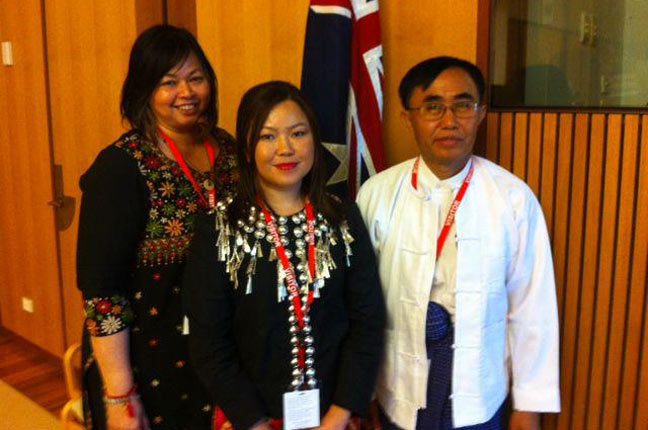
By Claire Spoors, Publish What You Pay Australia Coordinator
I recently travelled to Parliament House in Canberra with Burmese activists who were speaking at a seminar organised by the Burma Campaign Australia. The question addressed during the seminar was, ‘Will foreign investment alleviate poverty in Burma?’ This question is particularly timely as in the last two years Burma’s military leaders have sought to open up the country to foreign investment under the pretext of setting a reform agenda.
There are concerns, however, that talk of reform is just that – talk rather than action. Worryingly, in the last two years land grabbing linked to foreign investment has led to an escalation in conflict in ethnic areas with Burmese troops implicated in serious human rights abuses. Nevertheless, western countries, including Australia, have been eager to lower sanctions and allow their industries access to Burma which is rich in oil, gas and mineral reserves.
Burmese activists and the Burma Campaign Australia are calling on the Australian Government to introduce legislation that will require Australian oil, gas and mining companies to publish all payments they make to the Government in Burma. This will help ensure Burma’s leaders are held accountable for the projected influx of money into country and that this much-needed revenue is used to the benefit of citizens.
The perception of corruption in Burma is very high, a perception that is well founded. In 2008, a study by the International Monetary Fund found that less than 1% of revenues from gas production made it into the national budget. With a major new gas development, the Shwe Gas Project – which is expected to earn the $29 billion in revenues over 30 years – due to come on stream this year, increasing the transparency of payments from extractive companies to the Burmese Government is of ever greater importance.
Although financial transparency is not a silver bullet for ending corruption, without it the future for the Burmese people could be bleaker than the present. That may seem hard to believe but when you look at other countries such as the Democratic Republic of the Congo and Angola, which have engaged in wholesale resource extraction without transparency or good governance, the outcomes have been disastrous for ordinary citizens. This is not just in terms of a lack of development but in terms of conflict and human rights abuses.
Aung San Suu Kyi stated last year that other countries could help prevent such outcomes in Burma by stopping their companies from partnering with the state-owned Myanmar Oil and Gas Enterprise if they do not have effective transparency mechanisms in place.
Companies listed or based in the United States and Europe including Chevron, Total and PetroChina will have to publish payment information under new laws introduced in those jurisdictions. But because no such law exists in Australia, companies such as Woodside will not be required to do the same. This is regrettable as Woodside has recently signed two oil and gas deals in Burma and there is no way for the Burmese people to know what the deal is worth.
Burma Campaign Australia is a member of Publish What You Pay Australia. In the coming weeks Publish What You Pay Australia will launch its “our resources, our right to know” campaign. This campaign supports people all around the world living in resource-rich countries to know what their governments earn from the extraction of their natural resources. Nowhere is this more urgent than in Burma. Let’s hope the parliamentarians we met with in Canberra were listening.
Act:
Call on the Australian Government to act and introduce legislation requiring mining and oil and gas companies to publish what they pay to governments where they operate by sending a message to the Treasurer, Wayne Swan.
You can find out more at pwyp.org.au, follow us on Twitter @PWYPtweets and on Facebook at facebook.com/PWYPAustralia.